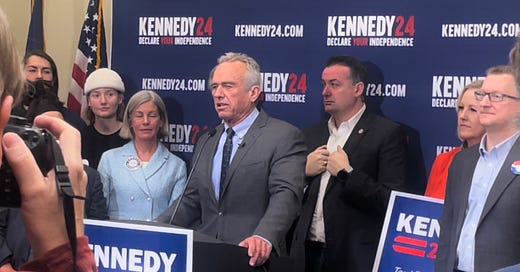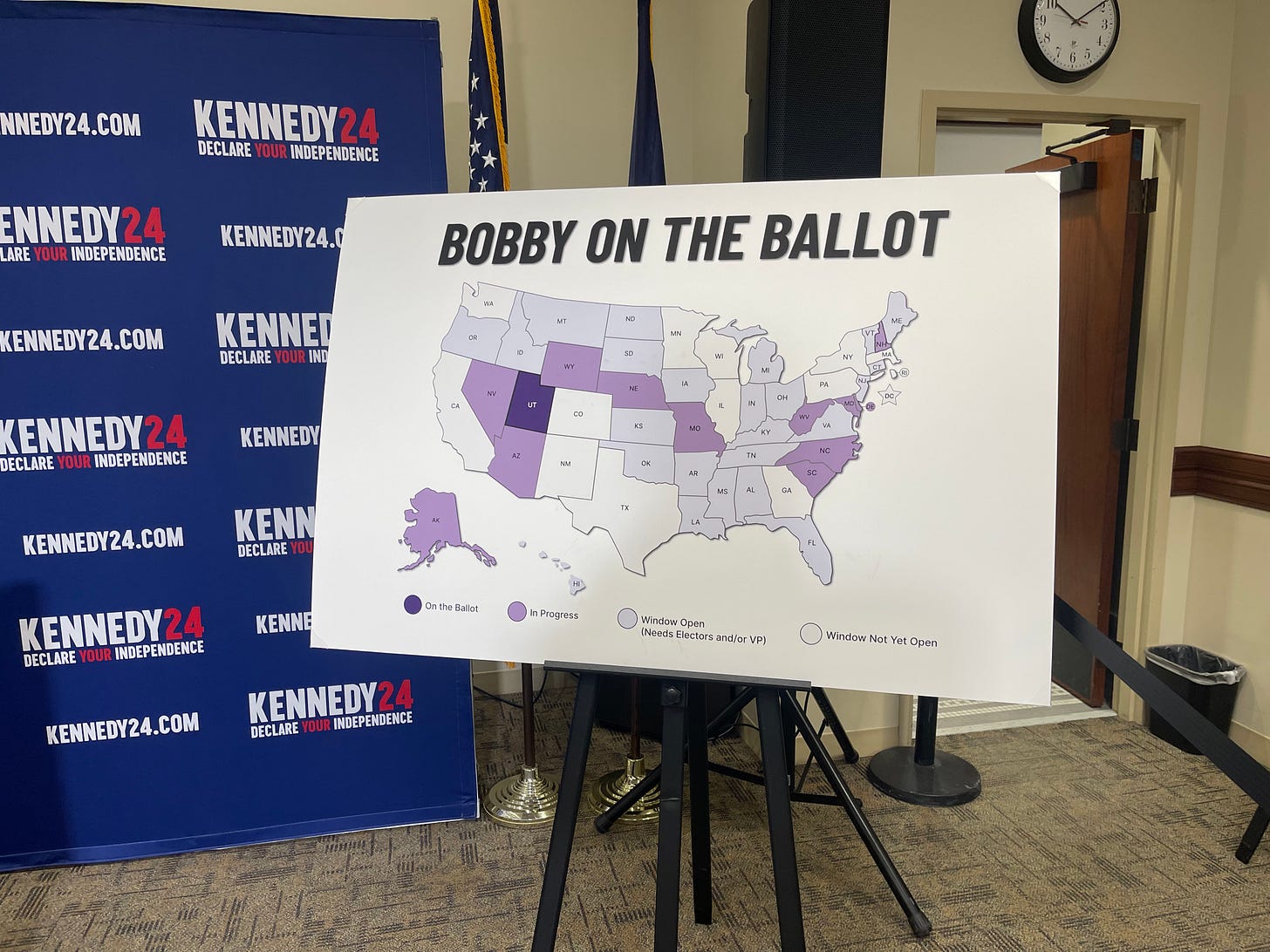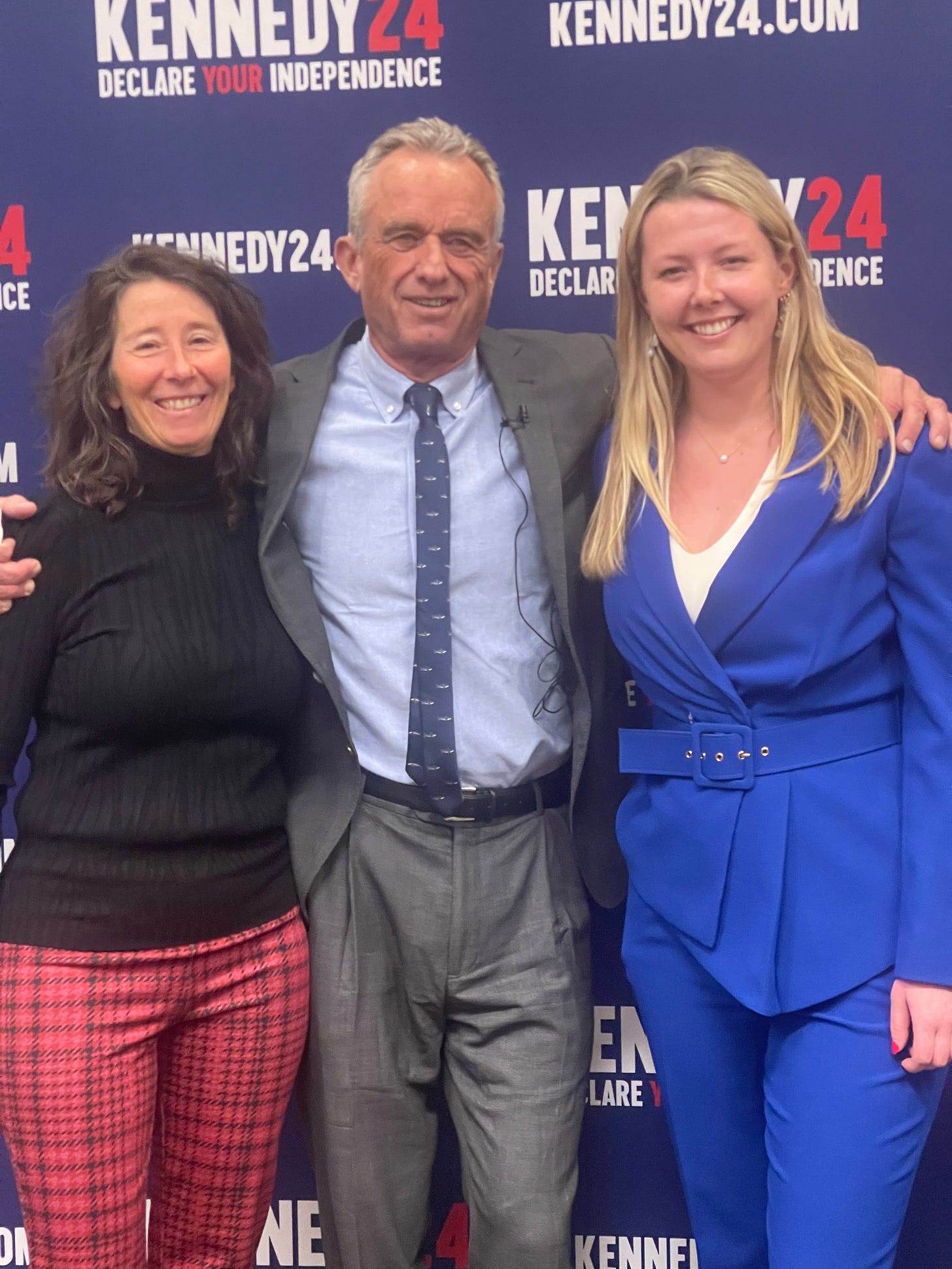Ballot Battles for Kennedy Amidst Rising Polls; Ready to Face Trump 'Fair and Square'
Independent candidate criticizes Maine & Colorado decisions to block the Donald
Flanked by supporters on Salt Lake City’s Capitol Hill Wednesday morning, Bobby Kennedy, Jr. stood by a United States map depicting shades of purple, the deepest tone darkening Utah, where his fledgling campaign had just made its first official ballot registration. His stock is rising.
“We’re within single digits of catching both President Trump and President Biden,” Kennedy said citing polling that put him between 22 and 27 percent in battleground states, and flat out leading both major party candidates with voters under forty-five years old.
These are significant figures at the dawn of 2024, but with legal clashing over ballots clearly in the cards the need for procedural organization all but drums out his message for the moment.
Kennedy, a lawyer himself, announced a “litigation team” that won its first battle here in the pioneer state in gaining an extension of a January 8th deadline to get a thousand signatures properly documented. The lieutenant governor made preemptive concessions but a small team of volunteers did the job through sleet and snow last week and delivered an over the top roll, early and in good form.
“That’s one down, fifty to go,” concluded campaign press secretary Stefanie Spear accounting for the next forty-nine states and the District of Columbia. Each of which has timelines, challenges and idiosyncrasies that require constant management and communication.
“It’s negotiating this labyrinth of these arcane rules that we now have in every state that are all designed to suppress dissent, to make sure that there are no options for Americans outside the major political parties,” Kennedy said with a hint of the edge that’s defining his defiant campaign, and guaranteed he’d achieve full ballot access before the election.
One could feel the administrative weight on the man who would prefer to be talking about how to tackle corporate capture of government agencies, or stemming the tide of chronic disease rising in American kids.
But the track to leadership has to be laid. And from this small room inside a state senate building in the shadow of the Wasatch Mountains, the candidate painted a picture of West Virginia, wherein through the hills and mining towns, county by county registrations are required before the campaign can begin collecting signatures. And in Massachusetts, where errant marks on petition pages can disqualify any number of otherwise aptly gathered respondents.
Some states like California and New York require hundreds of thousands of signatures in compressed time periods, and sometimes secretaries of state and other officials who run state election apparatus don’t know the rules themselves. But Kennedy takes a bright-side look at having to dispatch the waves of volunteers and spend the money required (he estimates $15,000,000) to cover the national landscape and face the perfunctory prerequisites:
“We’re going to have a better army on the street in November of 2024 when we need to get out the vote,” he said confidently. He’s pointed in recent days to volunteers numbering now around a quarter million, more than the other campaigns, but the official resistance is relentless. Even while celebrating getting on the Utah ballot the candidate made the announcement that Maine, New Hampshire and North Dakota “are refusing to send us ballot petitions.”
I asked Kennedy about Maine in particular where last week the secretary of state denied ballot access to Donald Trump, which followed Colorado’s State Supreme Court in doing the same and while dozens of other states consider similar measures. We all expect to hear from the United States Supreme Court at some point as to whether Trump can hold office in the wake of promoting an insurrection in 2021, as many claim he did, and that it was a constitutionally disqualifying event.
“I’m not a fan of Donald Trump that’s why I’m running against him,” Kennedy said, “but I’ve been outspoken about criticizing the Colorado decision and the Maine decisions because we have a democracy in this country. We don’t have a banana republic or at least we’re not supposed to. People want to be able to vote for who they want to vote for.” He went on to lay it plain about Trump, “I believe I can beat him in an election. I can beat him in a debate. And I want to do that fair and square.”
Kennedy doesn’t see how the Supremes can rule against Trump considering the complaints revolve around constitutional prohibitions stemming from insurrection, but whereas Trump has not been tried or convicted of said insurrection:
“I don’t think it’s fair. I don’t think there’s due process in punishing him for a crime he was never convicted of. It’s not the American way of doing things.”
Neither are lockdowns or medical mandates or the alignment of government agencies with corporations who want to control the population. These issues, not the tornado of ballot initiatives, will color the Kennedy campaign for what it is in due time. He wants to promote the people of this country as “citizens,” perched now on the icy precipice of becoming “subjects” of state-run media and economics.
But first he’s got to get more purple on that map. Deep Purple marks full ballot access. Some might remember the seventies British rock band and their signature tune with four simple chords and the title refrain, “Smoke on the water (and fire in the sky),” images evoked from the true rock and roll story of a Swiss casino fire.
But in the context of this American campaign, that ‘deep purple’ on the candidate’s map marks the course of a natural revolution.
Let it burn, Bobby. Let it burn.
Robert F. Kennedy, Jr. with campaign press seceetary Stefanie Spear (left) and chief of staff Brigid Rasmussen in Salt Lake City, Utah where he announced he’s on the 2024 ballot, his first registration, Wednesday morning.






